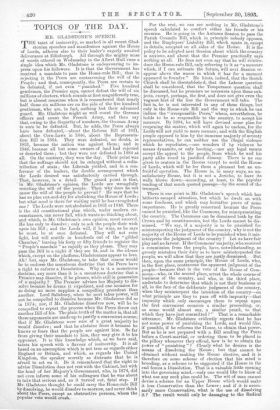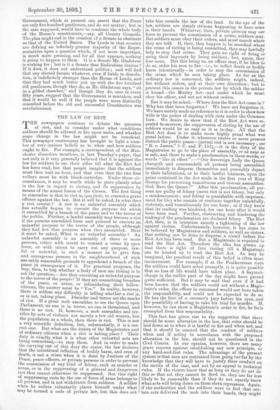TOPICS OF THE DAY.
MR. GLADSTONE'S SPEECH. THE taint of insincerity, so marked in all recent Glad- stonian speeches and manifestoes against the House of Lords, adheres also to their leader's eagerly awaited deliverance at Edinburgh. All through the mighty mass of words uttered on Wednesday in the Albert Hall runs a single idea which Mr. Gladstone is endeavouring to im- press upon his followers. It is that the Government has received a mandate to pass the Home-rule Bill ; that in rejecting it the Peers are contravening the will of the People ; and that, consequently, the Peers are certain to be defeated, if not even "punished." Five hundred gentlemen, the Premier says, cannot defeat the will of six millions of electors, which sounds at first magnificently true, but is almost nonsense when it is remembered that nearly half those six millions are on the side of the five hundred gentlemen, who are, in fact, nothing but their advanced guard. Mr. Gladstone might as well count the German officers and count the French Army, and then say that, owing to the disparity of numbers, the German Army is sure to be defeated. But, he adds, the Peers always have been defeated,—about the Reform Bill of 1831, • about the Corn-Laws in 1846, about the Representa- tion Bill in 1884. They were defeated, no doubt, in 1831, because the nation was against them ; and in 1846, because all but some owners of land had rejected or deserted them; but they were not defeated in 1884 at all. On the contrary, they won the day. Their point was , that the suffrage should not be enlarged without a redis- tribution of seats ; the Liberals yielded, and in a con- ference of the leaders, the double arrangement which the Lords desired was satisfactorily carried through. That, however, is a detail. The grand point is that, in Mr. Gladstone's opinion, the Lords are wrongfully resisting the will of the people. Then why does he not cause the will of the people to prevail ? He says that he has no plan cut-and-dry for abolishing the House of Lords ; but what need is there for waiting until he has excogitated one ? The Lords were not abolished in 1831 or 1846. There is the old constitutional plan which, under modern cir- cumstances, can never fail, which wants no thinking about, and which, in Mr. Gladstone's own opinion, must succeed. He has only to dissolve ; only to ask the people their wish upon his Bill ; and the Lords will, if he wins, as he says he must, be at once defeated. They will not even fight, but will scuttle in hundreds out of the "gilded Chamber," leaving his forty or fifty friends to register the "People's mandate" as rapidly as they please. They may pass the Bill in a night if they see fit, and in the silence which, except on the platform, Gladstonians appear to love. Ah ! but, says Mr. Gladstone, to take that course would be to endorse the monstrous doctrine that the Peers have a right to enforce a Dissolution. Why is it a monstrous doctrine, any more than it is a monstrous doctrine that a Premier may dissolve, if he pleases, while still in possession of a majority ? The Premier advises her Majesty to dis- solve because he deems it expedient, and one occasion for so doing no more supplies a compelling precedent than another. Lord Salisbury, when he next takes power, will not be compelled to dissolve because Mr. Gladstone did so in 1874; nor, if Mr. Gladstone dissolves now, will he be compelled to repeat the process when the Peers throw out another Bill of his. The plain truth of the matter is, that all these arguments are made up to justify a convenient course; that if Mr. Gladstone were sure of a great majority he would dissolve ; and that he abstains from it because he knows or fears that the people are against him.. So far from giving their mandate to him, they may give it to his opponent It is this knowledge which, as we have said, 'taints his speech with a flavour of insincerity. It is all based on an assumption which is not true as regards either England or Britain, and which, as regards the United Kingdom, the speaker secretly so distrusts that he is afraid to act on it. Be it remembered that the right to advise Dissolution does not rest with the Cabinet, but with the head of her Majesty's Government, who, in 1874, did not even inform some of his colleagues that he was about to take that serious and, as it turned out, fatal step. If Mr. Gladstone thought he could carry the Home-rule Bill by dissolving, he would dissolve to-morrow, and never think about the Peers, except as obstructive persons, whom the popular vote would crush. For the rest, we can see nothing in Mr. Gladstone's speech calculated to comfort either his friends or his enemies. He is going in the Autumn Session to pass the Parish Councils Bill, which in principle nobody opposes, and the Employers' Liability Bill, which again is, except in details, accepted on all sides of the House. It is the policy to be adopted next Session about which the country is anxious, and about that the Premier practically says nothing at all. He does not even say that he will reintro- duce the Home-rule Bill, only referring to it as "a measure which, if I can estimate the future, will next Session re- appear above the waves in. which it has for a moment appeared to founder." He hints, indeed, that the Scotch Church shall be disestablished, that the Labour question shall be considered, that the Temperance question shall be discussed, but he promises no measures upon these sub- jects, except, perhaps, the first, and does not give even the vaguest hint of the line the Government will take. The fact is, he is not interested in any of these things, but only in the Home-rule Bill and the way in which he can induce the "irresponsible Peers," whom, nevertheless, he holds to be so responsible to the country, to accept his measure. By 1894, be will have devised some plan for reopening the matter, which will again be useless, for the Lords will not yield to mere menace ; and with the English people opposed to him by the immense majority of seventy representatives, he can neither use the illegal violence which he repudiates,—one wonders if by violence he means dynamite, or only hooting,—nor any legal means except the appeal to the people, from which he and his party alike recoil in justified. dismay. There is no cue given to orators in the Recess except to scold the House of Lords, which will be for them a pleasant but an un- fruitful operation. The House is, in many ways, an un- satisfactory House, but it is not a Jericho, to have its walls blown down—according, at least, to the popular reading of that much quoted passage—by the sound of the trumpet.
There is one point in Mr. Gladstone's speech which has hitherto escaped attention, but which he dwelt on with some fondness, and which may hereafter prove of some importance. He is greatly concerned because the Peers cannot be punished, like the Commons, for misrepresenting the country. The Commons can be dismissed both by the Crown and by constituencies, but the Lords cannot be dis- missed. "We say, if a majority is to be punished for misinterpreting the judgment of the country, why is not the majority of the House of Lords to be punished when it mis- interprets the judgment of the country ? Let us have fair play and no favour. If the Commons' majority, who received a commission from the people, have, notwithstanding, so grossly mistaken their duty as to have misinterpreted the people, we will allow that they are justly dismissed. But then, upon the same principle, the House of Lords, who, ia the first place, contravene the apparent judgment of the people—because that is the vote of the House of Com- mons—who, in the second place, arrest the whole course of business of the country, and who, in the third place, undertake to determine that which is not their business at all, in the face of the deliberate judgment of the country, when they misinterpret the intention of the country—on what principle are they to pass off with impunity—that impunity which only encourages them to repeat upon the first convenient occasion a similar proceeding, or, as some would almost say, a similar prank, to that which they have just committed ? " That is a remarkable utterance. Mr. Gladstone evidently regrets that he has not some power of punishing the Lords, and would like, if possible, if he reforms the House, to obtain that power. But as he is not prepared with a Bill sending the Peers before a Court-martial, or ordering them to be placed in the pillory whenever they offend, how is he to obtain the power of " punishing " ? Clearly what he desires is the means of dissolving the House ; but that cannot be obtained without making the House elective, and it is therefore on some scheme of election that his mind is brooding, as a scheme to be suggested if the House in the end forces a Dissolution. That is a valuable little opening into the governing mind,—only one would like to know of what use any such plan could be. The wit of man cannot devise a scheme for an Upper House which would make it less Conservative than the Lower ; and if it is neces- sarily more Conservative, what is the use of dissolving it ? The result would only be damaging to the Radical Government, which at present can assert that the Peers are only five hundred gentlemen, and do not matter; but in the case supposed, would have to condemn the whole body of the House's constituents,—say, all County Councils. The plan might end in the creation of a Senate as obstinate as that of the United States. The Lords in that country are defying an infinitely greater majority of the Repre- sentatives upon a question which, if not more important, is much more pressing, and for all that appears, nothing is going to happen to them. It is a Senate Mr. Gladstone is wishing for ; but is it a Senate that Radicalism desires ? If it does, it does not understand politics ; and will find that any elected Senate whatever, even if liable to dissolu- tion, is indefinitely stronger than the House of Lords, and that they had much better put up with the five hundred old gentlemen, though they do, as Mr. Gladstone says, "sit in a gilded chamber," and though they do, once in every fifty years, suggest that the Government is mistaken, and that it would be well if the people were more distinctly consulted before the old and successful Constitution was revolutionised.



































 Previous page
Previous page